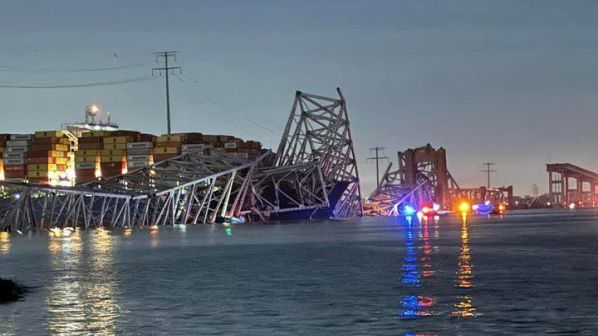NORTH American Class 1 railways, CSX and Norfolk Southern (NS), say that their customers should expect delays with some shipments following the tragic collapse of the I-695 Francis Scott Key Bridge, which spans the Patapsco River in Baltimore, on March 26.
A container ship weighing 95,000 gross tonnes struck the main pier of the bridge causing a section of the 2.6km-long structure to collapse into the river. Six people are presumed dead following the collapse. A mayday call from the ship, which had set sail from the Port of Baltimore and is suspected to have lost power, enabled authorities to close the bridge to road traffic, preventing further loss of life.
Although the Port of Baltimore is the 20th largest in the United States, it is the largest single handler of car and light van shipments, with nearly 850,000 such vehicles passing through the port in 2023. The port also handles significant quantities of agricultural products, coffee and sugar, and carried a record volume of international freight last year.
It is currently unclear for how long debris from the bridge will block the river and access to the port for ships, although lorries are still being processed. And while it is likely that many of the ships bound for Baltimore will be diverted to other east coast ports, the accident is a serious blow to the port operations of CSX and NS, especially for intermodal, automotive and coal traffic. CSX says that while freight traffic has not been entirely halted in the region, certain commodities have been impacted by the incident.
“In light of the bridge collapse impacting vessel access to the port, all international intermodal shipments destined for Baltimore have been temporarily suspended,” CSX said in a statement. “In-gated traffic originating from other locations and destined for Baltimore is on hold until further notice. The CSX team is working with international customers to identify alternative solutions to support cargo movement to and from Baltimore.”
The railway says that domestic intermodal traffic destined for Baltimore remains unaffected. It adds that it has capacity to dispatch additional trains to CSX-served coal terminals in Baltimore and will keep its Curtis Bay Coal Pier facility operational, although it is working on contingency plans.
“CSX is committed to keeping customers informed and will continue to provide updates as information becomes available,” the railway says.
NS told Railway Age that it is working directly with impacted international customers, port partners and state officials to help maintain the integrity of the global supply chain.
“Ports on the East Coast are resilient and have the capacity to serve the flow of freight,” NS says. “Our network touches every major port on the eastern seaboard, and we have proactively reached out to help our customers and provide alternate routing solutions. Significant supply chain events demand a rapid response approach, frequent communication and innovative solutions, and NS is doing all three of these things to help our customers and partners navigate through this challenge.”

